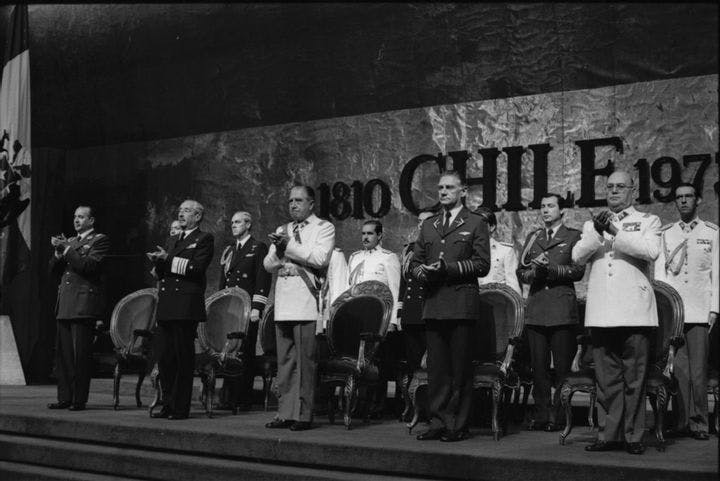Summer 2008
Spain's Memory Wars
– The Wilson Quarterly
Spain's calls for justice against Augusto Pinochet raised a clamor for the country to come clean about atrocities committed during the Franco years.
Call it Pinochet’s revenge. When Spain asked Scotland Yard to go to a private London hospital in 1998 and arrest Chile’s former dictator, General Augusto Pinochet, on charges of murdering Spanish émigrés, the shock waves hit Spain even harder than his home country. Spain seemed morally hypocritical for attempting to prosecute a foreign autocrat while adopting a policy of “collective amnesia” toward its own bloody civil war and nearly 40-year aftermath. When Spain went after Pinochet, who later died of natural causes at age 91 without ever standing trial, it could no longer ignore its own dictator, Generalissimo Francisco Franco, writes Omar G. Encarnación, a political scientist at Bard College. The worldwide reaction to the Pinochet arrest destroyed Spain’s unwritten “Pact of Forgetting” that had made the politically connected deaths of 580,000 Spaniards during Franco’s reign (1936–75) almost unmentionable.
Other countries, including Germany and Argentina, conducted trials to punish crimes of former despots and their henchmen. But in 1977, Spain legislated amnesty. Within a decade of Pinochet’s arrest, however, a dramatic shift in public attitudes led to the 2007 passage of a “Law of Historical Memory” to commemorate the vanquished and rebuke the myth that the victors—Franco’s fascist forces—were right.
International human rights organizations argue that the 2007 law continues to let the guilty off the hook. It metes out no punishment even for wholesale murder and torture. But the measure’s supporters in Spain note that it is the first declaration that the Franco regime was “illegitimate” and requires visible symbolic change—getting rid of ubiquitous Francoist monuments and renaming streets called “Avenida del Generalissimo,” which can be found in nearly every city.
Although there is consensus among Spaniards that the record needs to be corrected and history recovered, there is less agreement on what should be remembered, according to Encarnación.
By 2000, nearly half of the Spanish population was too young to recall either the civil war or the dictatorship, writes Carolyn P. Boyd, a historian at the University of California, Irvine. And though more than 15,000 books have been written about the period, there is still no agreement on the causes of the war and who was at fault. The Right continues to think Franco saved the country by eliminating Marxist atheists, and the Left believes itself victimized in the “Spanish Holocaust.” Boyd notes that most history textbooks simply describe the civil war as a “fratricidal tragedy.”
* * *
The Source: "Pinochet's Revenge: Spain Revisits its Civil War" by Omar G. Encarnacion, in World Policy Journal, Winter 2007-2008, and "The Politics of History and Memory in Democratic Spain" by Carolyn P. Boyd, in The Annals, May 2008.
Photo courtesy of Wikimedia Commons
